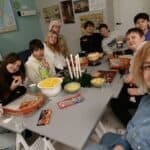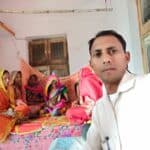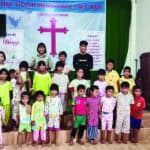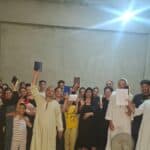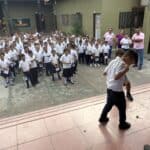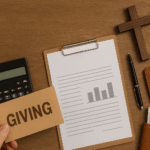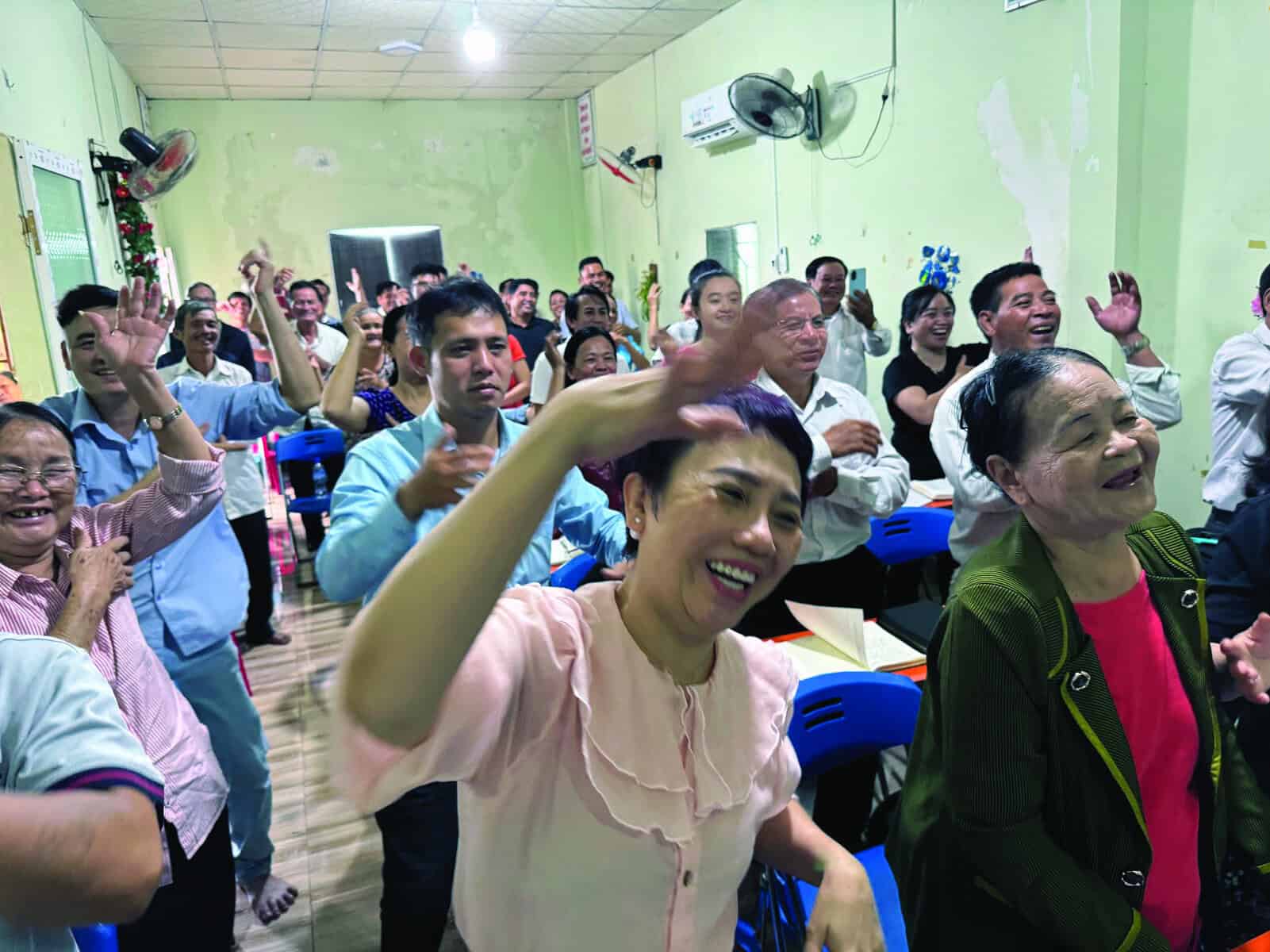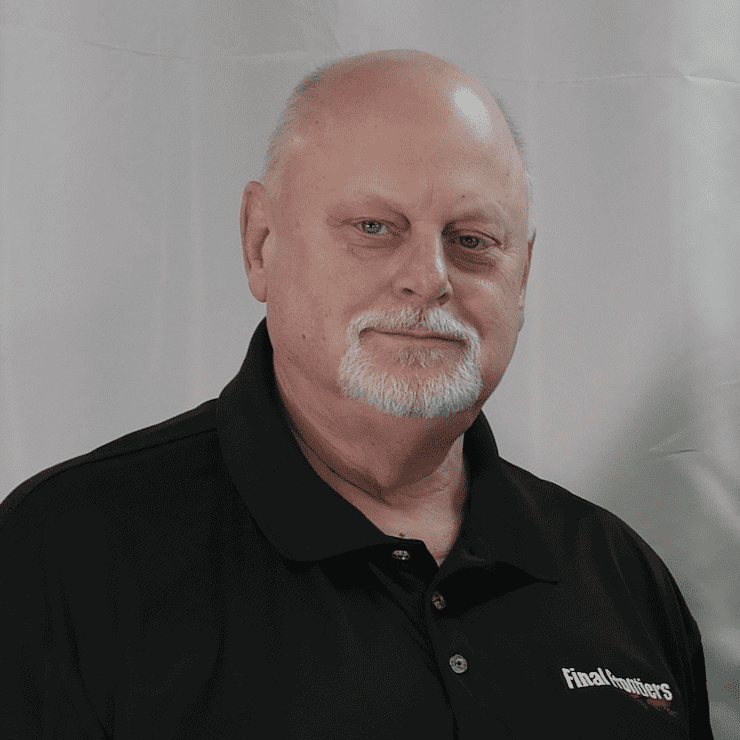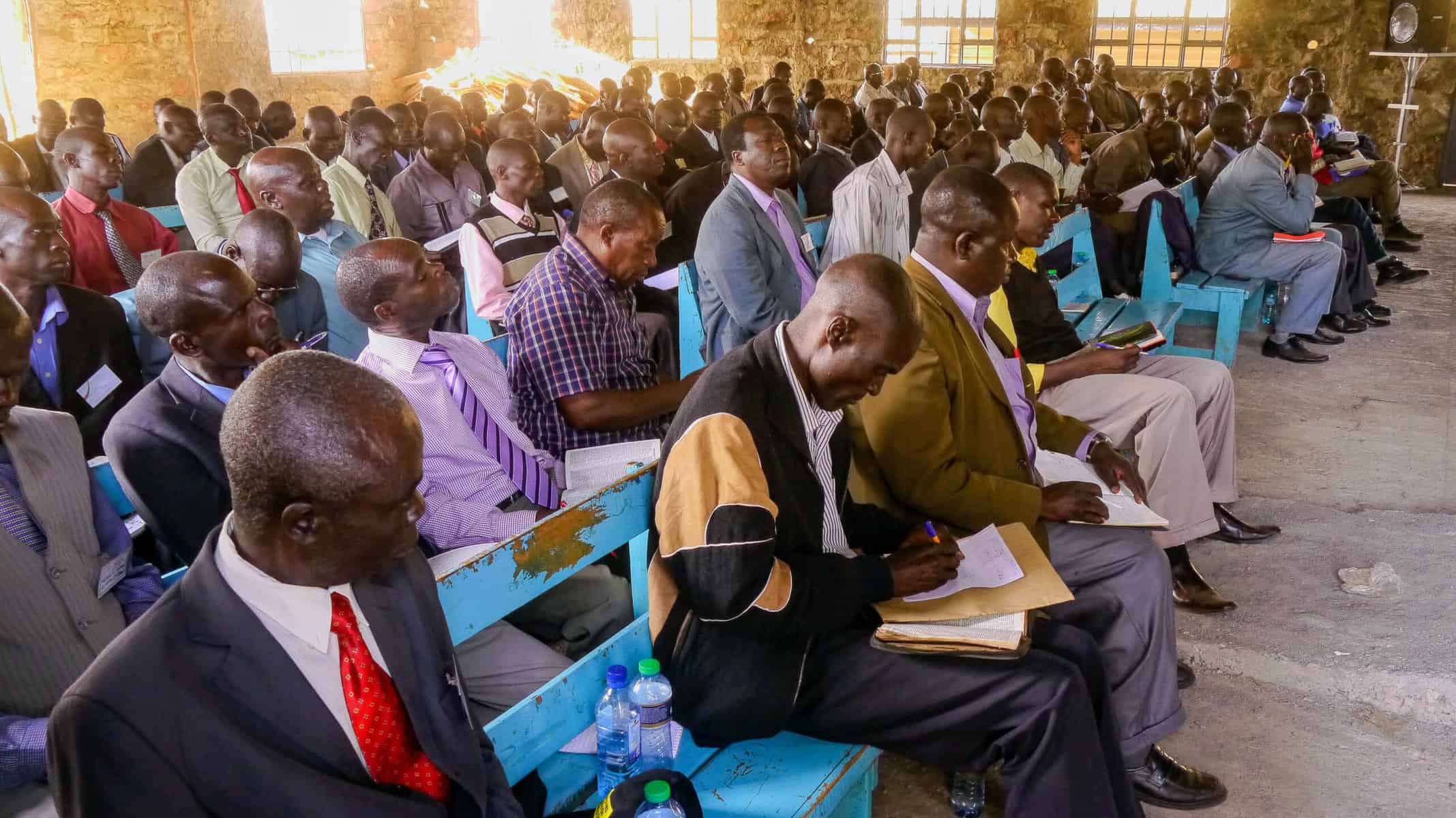Thirty years ago, I made my last trip to Vietnam. I returned in October, foolishly expecting things to be the same as in 1994. Thankfully, I was wrong.
My first trip was around 1992, I think. The year before, I was in Bangkok with a group of men from my brother David’s church. They had met several Vietnamese men at the Christian Guest House, where they were all staying. I was staying about two miles away at the home of our national director, Kiatisak Siripanadorn.
These men arranged for me to meet a young man about my age named Minh Dang. At the time, he was returning to Vietnam to meet a group of pastors with whom his dad had ministered before and during the war. When Saigon fell, the group insisted Minh’s family flee so that his dad, Cang Noc Dang, would not be arrested and, subsequently, disappear. Their refugee craft was discovered more than a week later, floating in the Pacific Ocean en route to the Philippines.
From there, the family relocated to Akron, Ohio. Minh’s father, now in Heaven, maintained contact with the growing number of preachers in their group, providing limited funding and unlimited encouragement, which Minh always delivered personally, as his father was officially exiled.
I was intrigued by the possibility of helping church planters in that closed country, so we began investigating their family, ministry, and experience. Simultaneously, and unknown to me, Minh was using their contacts to investigate Final Frontiers and me.
A year later, after our investigation, I traveled to Vietnam to meet the men we would support. There is much I could say about that trip, and over the years, I have written about it often, so let me say simply that my heart became knit to theirs as David’s was to Jonathan.
Upon arriving, and after some disrespectful treatment at the airport, I was finally permitted to leave but was, of course, followed. Arrangements had been made for me to stay in a small hotel, where I was later joined by one of our prominent supporters, who had a burden for the country. This man was a farmer from Iowa who, several years later, sold his business and became a missionary in the Caribbean.
While there, the pastors began their systematic journey to meet me. To reduce the possibility of being noticed, some walked, some came by bus, some by car, and some by train. They had begun traveling, two by two, several weeks before. We met in my hotel room, which had no AC, and kept the windows shut so no one could hear our conversations. Day after day, we interviewed preachers on video, sweltering in the heat that any Vietnam veteran will unhappily recall. Several days later, when the task was complete, I walked over to the window, pulled back the curtain, and noticed two men on the street below, looking up at me and pointing. All our efforts to conceal our activities were for naught. Every preacher we met with was arrested and questioned over the next few weeks.
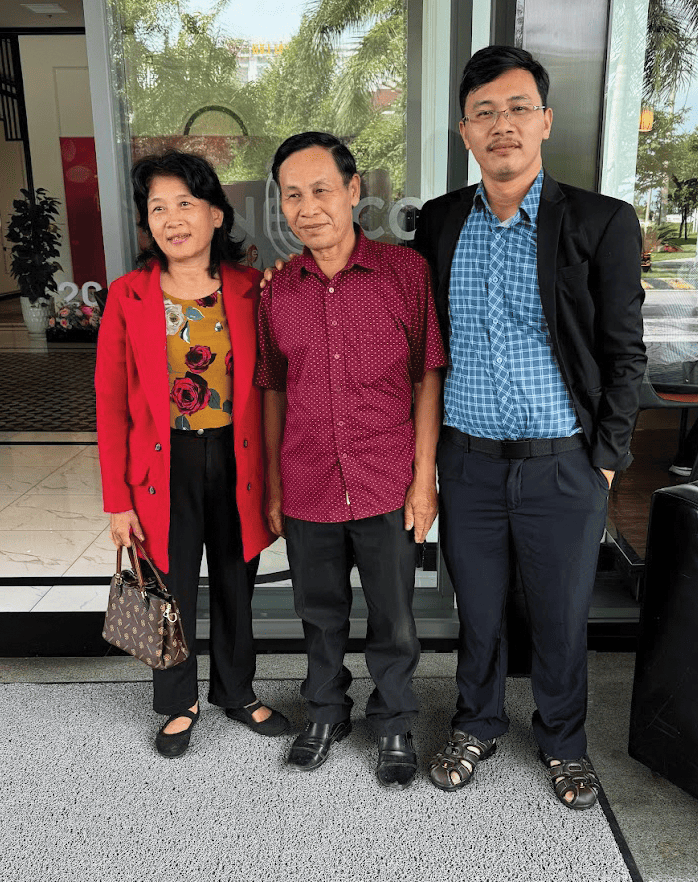

One preacher had not come, but his wife came in his place. I asked where her husband was, and she replied that he was in prison. She told me they had been married for seventeen years, and he had spent eleven of them, off and on, in prison. During that time, he had evangelized and discipled hundreds of prisoners, and some (I no longer remember the number) were among the pastors I had just met. His wife told me that she was able to visit him twice a year, and on each trip, she would bring one of their two children. I asked her why she and they did not go more often, and her reply was that she could not afford the bus ticket.
Wanting to help, I reached for my pocket and asked her what a ticket costs – her reply was “ten cents.” I was shocked that she only had 40 cents a year extra to buy tickets to visit her husband, so before she left, I gave her $100. On my next trip, he was still in prison. I have never met him.
As I said, I had videotaped all the testimonies of the men—which was an incredibly ignorant thing to do, but I was still learning. They gave their names, locations, the locations of the churches they had started, the pastors’ names, the deacons’ names, etc. Then, to attempt to appear as a tourist, we took a day trip to Cu Chi to visit the tunnels that allowed the Viet Cong and NVA to covertly invade one of our primary military bases and win a decisive victory. I had wanted to inspect the tunnels but learned I was too large. On our way back to the hotel, we were stopped and informed that we would give a free ride to a certain military officer going to Saigon.
Suddenly, we were all aware of the danger. I did not want to leave the videotapes in the room where they could be found, so I took them all with me in my camera bag beside me on the van’s back seat. As the officer entered, he saw me in the back and chose to sit beside me. So, I quickly put the bag on the floor, between my feet. We all welcomed him and were friendly to him, and he returned the courtesy. Naturally, he wanted to know who I was, why I was there, and what I felt about his country. He also wanted to know if I had been there during the war. I told him that I was not a veteran. (I had noticed that wherever I went, people were very rude to me. They mistakenly thought I was a “Soviet” and wanted nothing to do with me. When they learned I was an American, their attitude changed to friendliness and delight.)
As we drove, I spoke to the officer through a translator. We had a great time joking and laughing, and finally, I asked why he was going to Saigon. Of course, I had to refer to it as Ho Chi Minh City. He told me he was an intelligence officer and had been promoted to the highest position in that office because of his successes. So, I asked him what his job was, and he responded that it was to find, capture, and interrogate enemies of the state.
“What classifies a person as an enemy of the state?” I asked.
He responded it is anyone involved in spreading capitalism or Christianity.
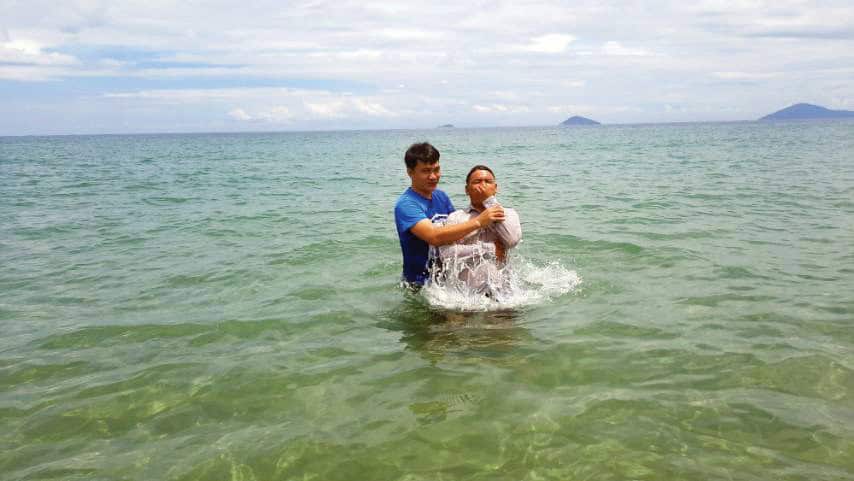
Here I was, sitting beside the one man in the country who had just been promoted because of his success in hunting Christians and pastors, and between my feet was a bag with many hours of preacher’s digital confessions. The evidence was inches from his grasp, and he had no idea. At that moment, the men turned around to look at me, and we all started laughing. That’s right, laughing. He asked what we were laughing at, but I do not remember what they told him. How incredible is our Lord! As we drove on, we immediately saw our Lord’s sense of humor and His power of protection. Finally, he had to stop at a bus station, but he asked me to exit the van before leaving because he wanted a picture with me. I must have been wearing a hat at the time, which I never do, so he took off my hat, put it on his head, and put his officer’s hat on mine, and with our arms over each other’s shoulders, we took the pictures.
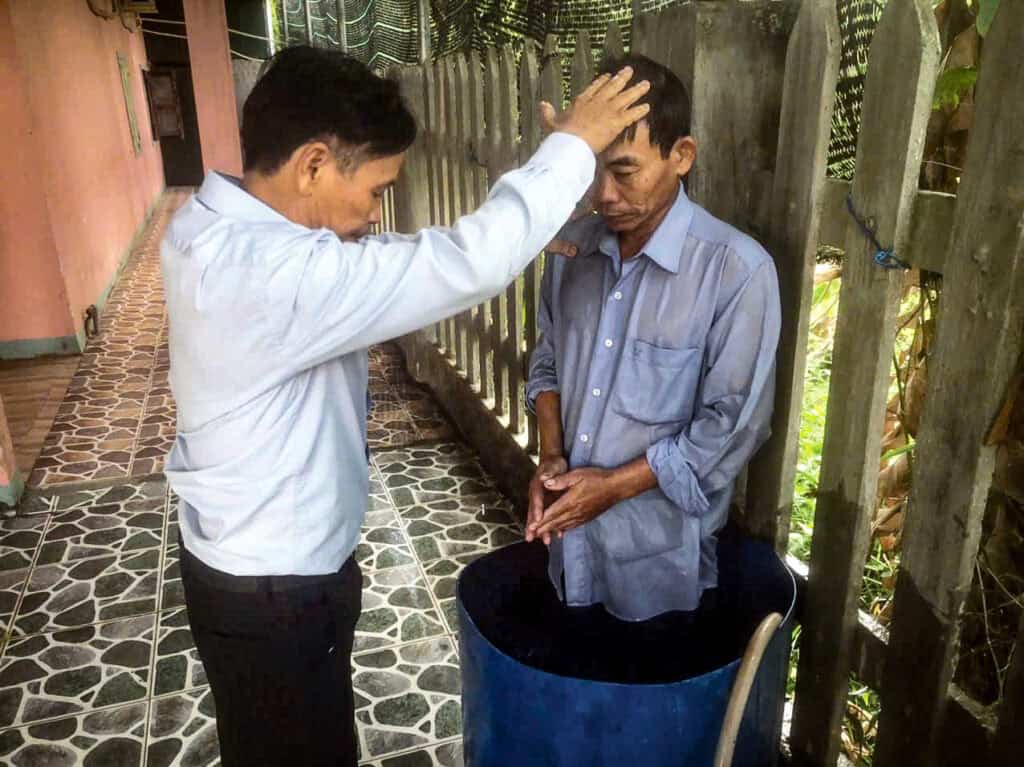
Before I left Vietnam, I made the mistake of having my film developed. Of the dozen or so rolls of film they developed, they returned only several photos to me, and these were among those I never received. (I hope they did not get him in trouble.)
In late 1993, I returned, not realizing I was now listed as “wanted.” Over the previous year, the government had learned that an American was funding the ministry in Vietnam. For some reason, they thought this American was a Vietnamese-born man who was now a naturalized United States citizen. Their confusion was because one night, while eating at a roadside hobble, the pastors had given me a Vietnamese name (alias) to cover my identity.
On this second trip, we were more cautious and continually saw the hand of God’s miraculous protection. I learned techniques for smuggling money to the preachers and participated in dead-dropping support at various public places. These lessons are among the same procedures we use now to smuggle Bibles throughout the Middle East and the Islamic world. It was also on this trip that one night, having been trapped in a town due to a monsoon (hurricane), I was stung nine times on my two feet by scorpions. Supposedly, one sting is enough to kill, but nine! The pastors with me were already asleep when it happened, and being paralyzed by the venom, I was unable to move or speak. I thought myself dead that night as I passed out, expecting to wake up in a few minutes in Heaven. Still, the next morning, I awoke with all the pastors around my bed, discussing how they would get my body back to America. When my eyes opened, they were all startled. I don’t remember much after that. For the next three days, I was in and out of consciousness–but alive.
Soon, my attention focused on expanding our support into Central America, Kenya, and India, so I did not return to Vietnam. For many years following, we supported the church planters there, never getting a report because of the danger of it being discovered. Basic correspondence was written, translated, and then encrypted so as not to reveal any secrets if discovered. Baptisms were swimming parties, conversions were loaves of bread, church planters were bakers, etc.
We continued and increased support as the number of their church planters grew to 123 preachers. Sometimes, people doubt the enormity of our successes because of the numbers we report. Still, we never received reports from 123 preachers in fifteen years (over 20% of our total preachers) because of the danger involved if their reports were captured. Officially, the most expansive ministry in Vietnam at that time was the CMA (Christian Missionary Alliance), which has Baptist roots. Officially, they had three more men than we did. However, we were supporting several dozens of their preachers, making us the unofficial largest ministry in the country.
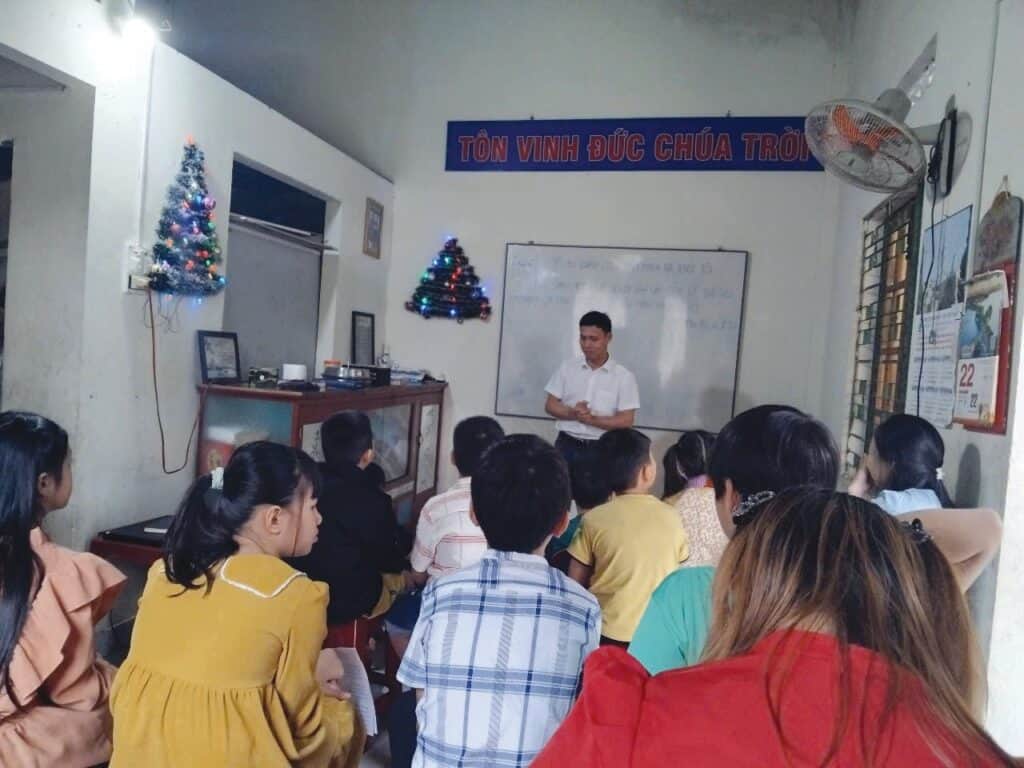
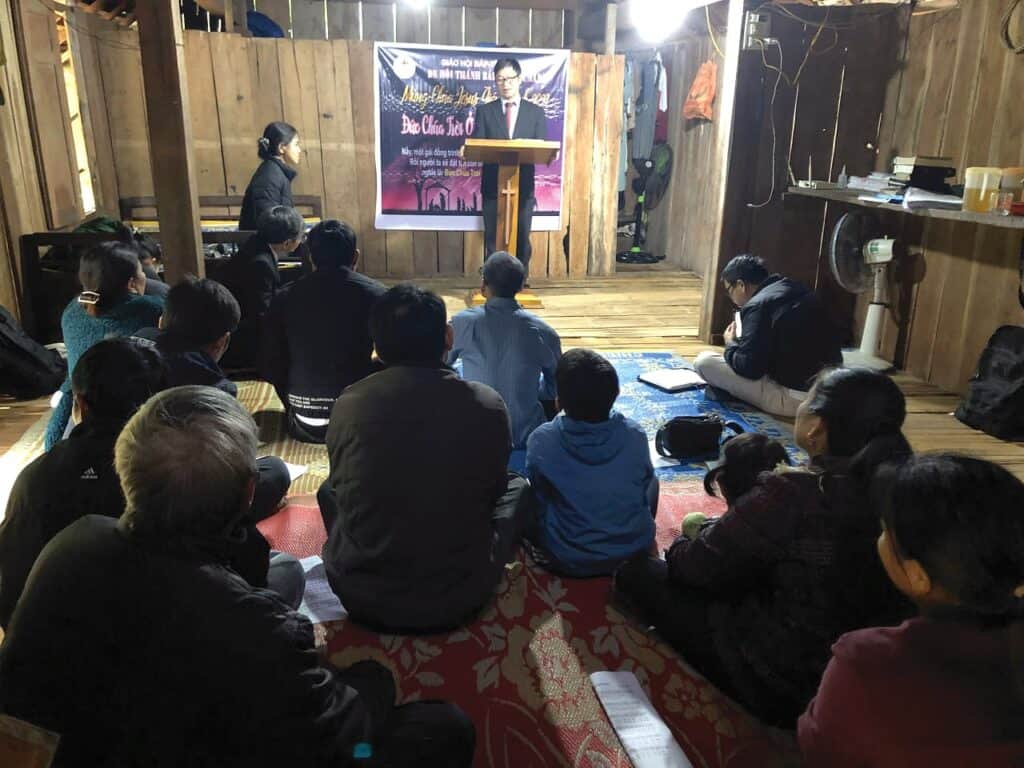

Then, one day, we received a letter from the leader of our group, Pastor Nguyen Toi. He thanked us for all our help and how it had “bought time” for them to start churches, train pastors, and grow beyond belief. He then said that because of their growing economy, they no longer needed financial help and asked that we give “their” money to preachers in need elsewhere. Bitter-sweet is the only term describing how I felt reading his letter. I was delighted they no longer needed our help. Their members had jobs, gave generously, and prospered, but we would no longer be partners in their ministry. It still hurts me. (Several months later, we received a similar letter from a group we served in Cambodia, which had over eighty men.)
To me, Vietnam has always been a place of oppression and poverty. I expected that people were still being hunted and imprisoned or executed because of their former connection with the South Vietnamese government, service in the military, or conversion to Christianity. On my trips, I seldom saw a smile or heard laughter, even in churches. And this is what I expected to return to – but I was wrong.
I returned to Vietnam in October at the request of my great friend, Pastor Mike Mutchler. Though he still serves on the Grandview Baptist staff, he is no longer the Senior Pastor. He has led his church in Beaver Creek, Oregon, to be our largest supporting church, year after year. Collectively, they fund Bibles, feed children, and provide us with more than one hundred sponsorships. For years, Mike had been going to Vietnam and asking me to join him; however, the only group he knew there was already involved with a ministry similar to ours. The founder of that group was led to Christ by my former father-in-law. When starting his mission work, he had spent a great deal of time with me on the phone discussing, from my experience, what to do, what not to do, etc. He is doing a great job.
In the spring of 2024, Mike called and asked me to go with him to Vietnam. He informed me that the ministry he was visiting was no longer involved with the other organization. He felt I would now be interested in meeting them and seeing their work. He did not know I had prayed for some time that God would allow us to work in Vietnam again. Here was the answer to my prayers.
I began corresponding with Steve Brockman after Mike introduced us electronically, and I was quite impressed. Every day, Steve would send me short reports of things happening in the ministry throughout Vietnam and provide photos. I still look forward to them. There were several things I noticed about Steve. First, Steve never talked about himself or “his” ministry. Second, he is not even considered a missionary but a retired businessman. Third, he is tireless in his efforts and not hindered by their lack of funding. Fourth, they love him; most call him father or grandfather, even naming their sons after him. Fifth, he has an incredible burden for God’s servants. As I got to know him, it seemed as if we were co-joined twins who had been separated at birth and lost contact.
Steve has always been a businessman, a bus worker, and a soul-winner, but never a pastor. As he grew older, he wanted to do more for the Lord. Steve had been making trips to Vietnam for business and determined that he would now work there for the Lord. In 2016, he sold his business in California and moved there, living off his IRA and Social Security. He lives modestly in a one-room discounted hotel room in Da Nang and doesn’t even have a car. Steve says paying for their version of Uber is cheaper than owning a car. And he’s right.
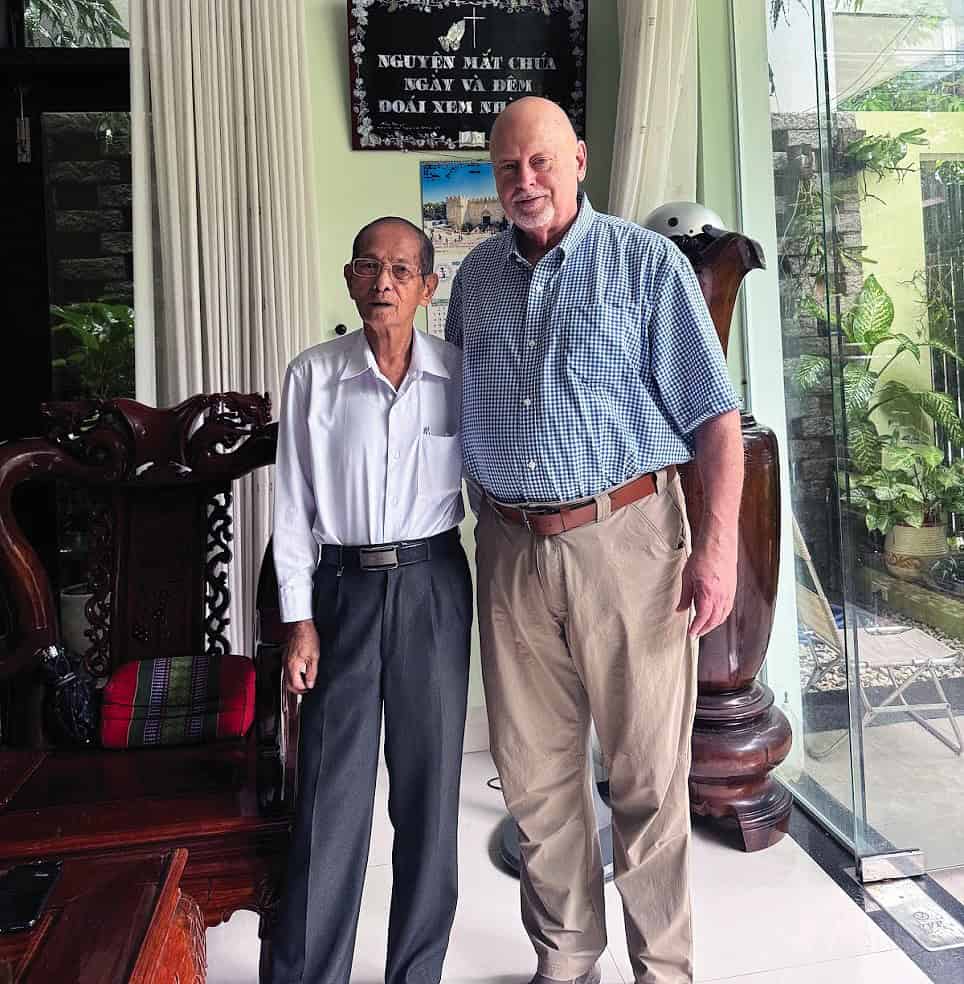
In October, we found and visited Nguyen Toi. His ministry now has an office and approved headquarters, and their churches are now legal and unhindered. I recognized him immediately when I saw him, but being in his 90s now, he did not remember me. He just starred and kept repeating the words, “Brad Pitt, Brad Pitt.” (I’m kidding) Since he didn’t remember the name “Jon Nelms,” I suggested that he had known me primarily by my Vietnamese name and asked if he remembered __. He said the name was familiar and believed he knew a man by that name many years ago. He asked me, “How do you know him?” I replied, “I am __ – you gave me that name in 1992 in Saigon.” His age had robbed him of the memory, but it is still fresh in mine. We will meet gain in Heaven, where we “will know, even as we are known.”
Steve rarely returns to America; when he does, he reports to his two or three supporting churches. He does not raise funds for himself but for the men and the ministry. Steve works with several “groups” and is welcomed by them all. He is there to help start churches and institutes and encourage and help. Since his involvement, they have started scores of churches and now operate eight Bible institutes in Saigon, Quang Ngai, Da Nang (2), Quang Tri, Khe Sanh, Kon Tum, and the Central Highlands. Currently, they are training 182 men and ladies. In the last four years, their graduates have already started twenty-two churches. Their plan for 2025 is to start another regional Bible institute and eleven more churches.
When I stepped off the plane at the Da Nang airport, it was obvious that Vietnam had changed. There is prosperity beyond what I had imagined, and though there are not many American visitors, the country is blessed with European and Australian tourists.
Every day, Steve took us to meet pastors and visit their house churches. Having a building is cost-prohibited, and their numbers are growing so fast that it is also unproductive. Construction is cheap, but the land is costly, so generally, the pastors will move to an area and use the ground floor as a church hall, and his family will live upstairs. Still, they are not registered, so they often have to shut down and move elsewhere, have their services on off days and at strange times, distinguish services as parties, close all windows during preaching, sing softly, and use various other techniques. Foreigners are not allowed to preach.
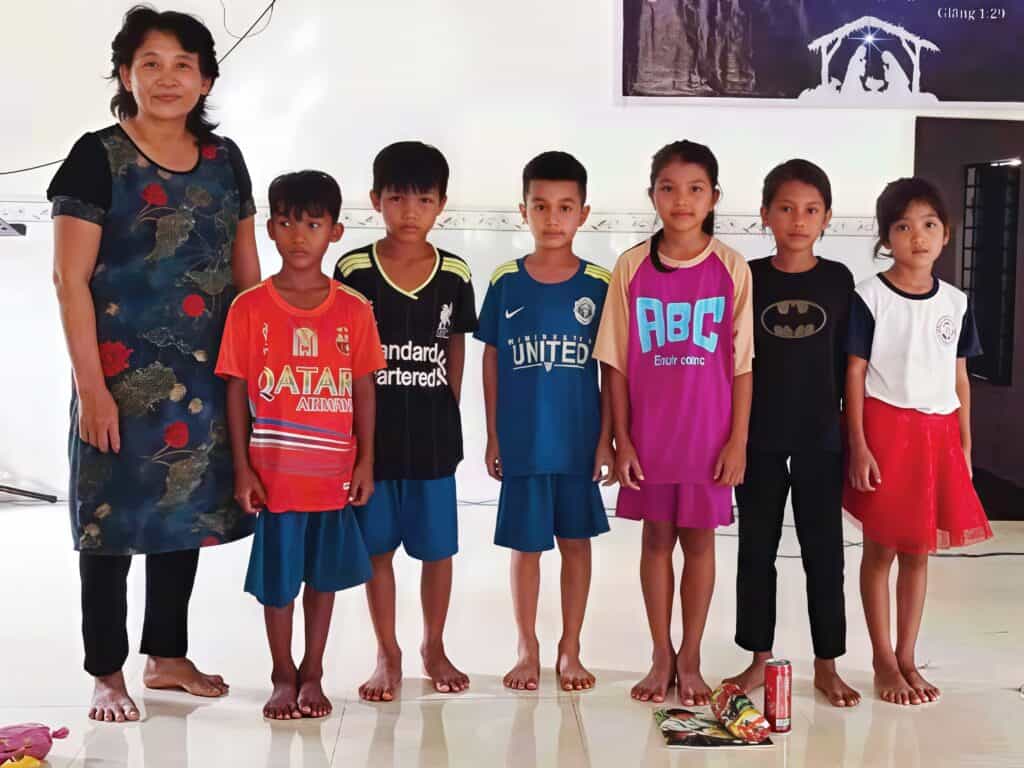
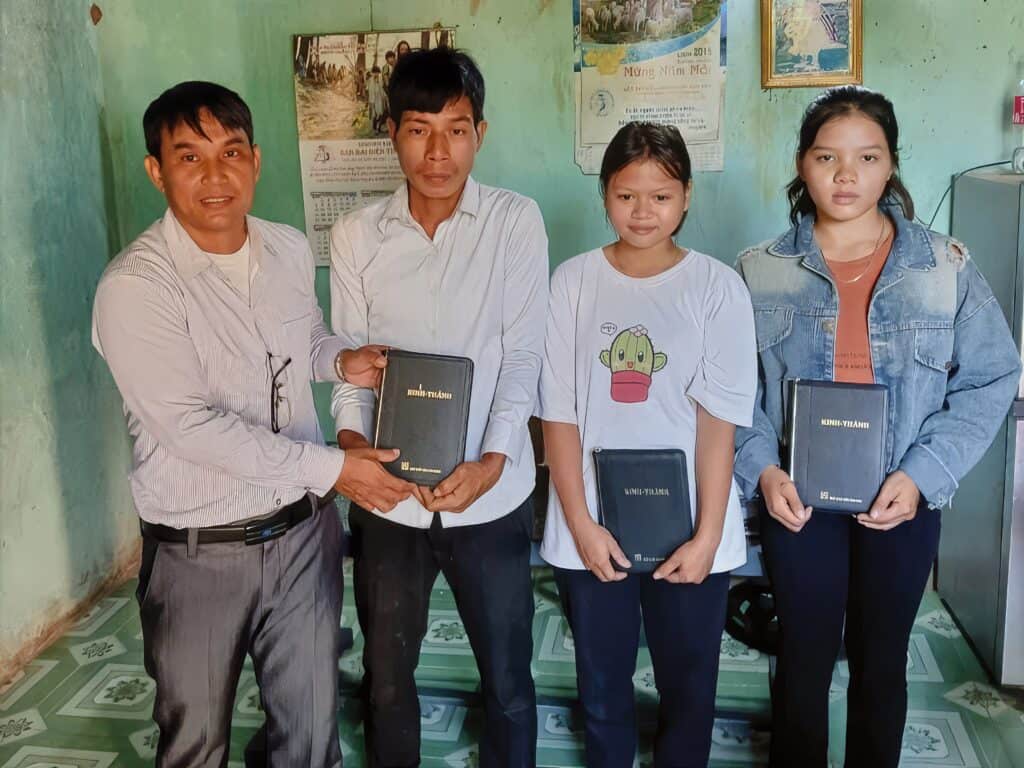
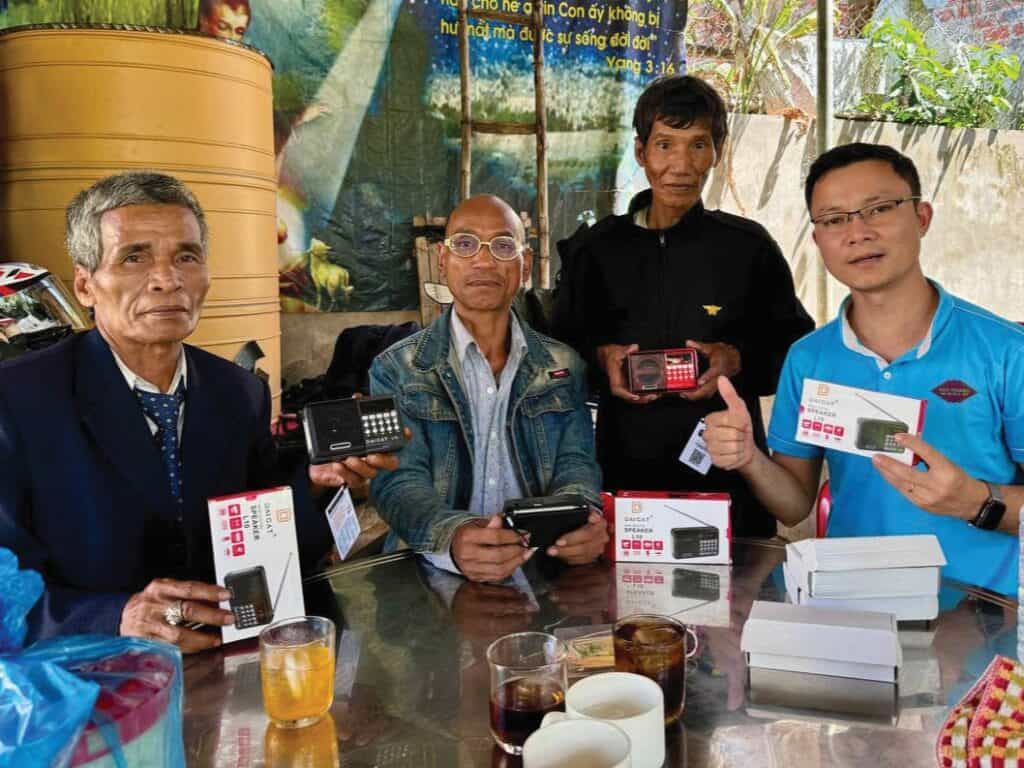
Daily, we would visit a group of believers in one town, then travel two or three hours to the next “service.” In some places, planned stops had to be eliminated because the police had received word we were coming and were preparing to “welcome” us with an interrogation party. While there, we visited Da Nang, Quang Nam, Quang Tri, Khe Sanh, Quang Ngai, several locations in Ho Chi Minh City, and various locations in the Highlands (where we were not supposed to be). While there, we visited and ate with some pastors who work with various tribal groups like the Co Tu, Bru, Co, and H’re. We also met a pastor who travels in and out of Laos on a motorcycle Final Frontiers provided him earlier this year. (Steve also has pastors in Laos, Cambodia, and the Philippines).
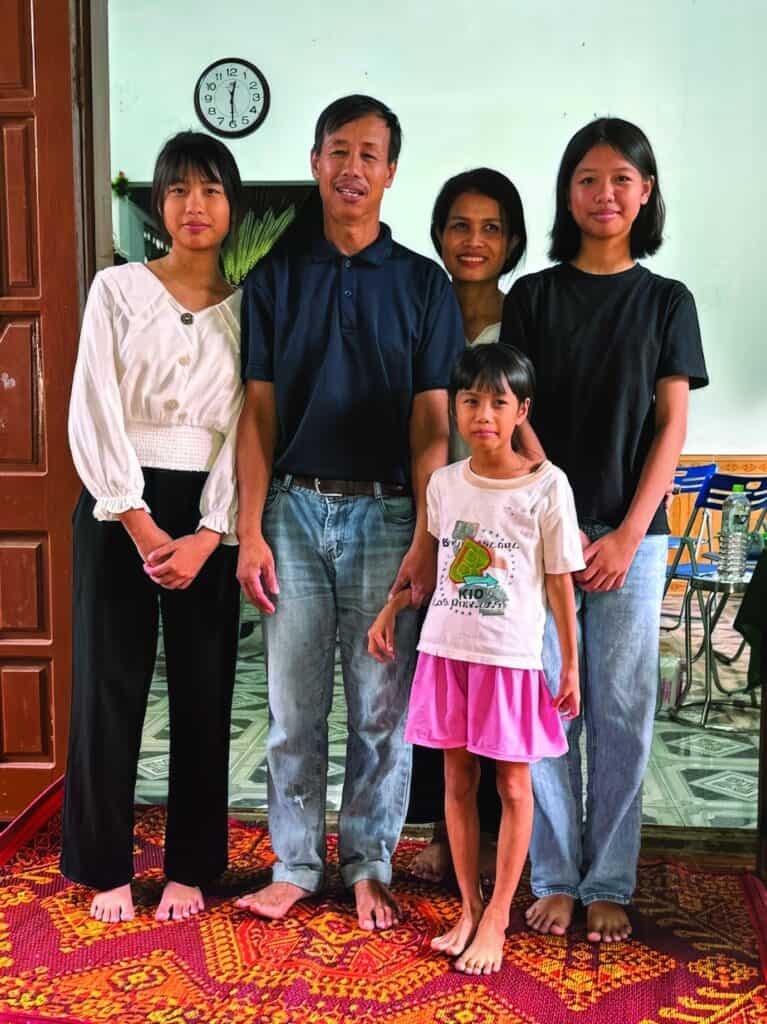
Evangelism methods in Vietnam have also had to adapt. There are no tracts to pass out, and you cannot gather people outside to talk. The government is afraid of revolution, so even in a cafe, more than three people at a table for longer than it takes to drink your coffee brings suspicion and questions. The giving out of literature is how Mao Zedong spread communism in China with his “Little Red Book,” so it is strictly prohibited to pass out printed materials such as tracts, Gospels of John, etc. You can evangelize and disciple; you just have to be careful how you do it.
While traveling in an area where most battles took place, villagers told us that they still find artifacts from the war, such as bones, equipment, dog tags, etc. It was strange to realize the area’s historical significance compared to how peaceful it is now. Jungles have been cultivated, villages rebuilt with cement and bricks, the roads paved – mostly, and even churches permitted because they are part of a registered group like the Christian Missionary Alliance, Southern Baptist, or Mennonites. These organizations sometimes offer legal “protection” to independent preachers.
While in what was formerly a jungle and is now tens of thousands of acres of what they call “paper trees,” we heard about two tribal families that had been forced from their villages due to their conversion to Christianity. Being homeless, a brother built two one-room houses on his farm for them to inhabit. He wanted us to meet them. Within a few minutes after arriving, we were told that the police had been informed of our presence and we needed to leave. We quickly and politely met the two families, offered encouragement and prayer, took a few photos, and turned to walk back to the car — but it was too late – the police were already there, and they were not happy.
As the pastor with us walked over to speak to the police, he told us to get in the car quickly. Steve, Mike, and I wanted to play the part of ignorant, innocent tourists. Walking past the police, we shook hands and quietly got into the car. A few moments later, our host arrived, and we quickly drove off, as he said, “before they change their minds.” He told them we were curious to see a farm, were from a humanitarian organization (Touch a Life), and wanted to see the house construction so we could consider helping with more. All true.
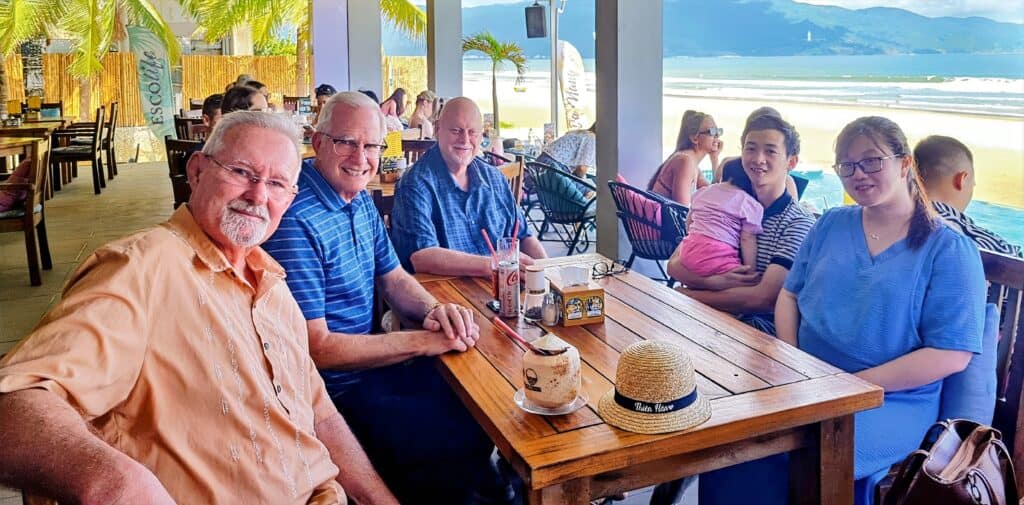
We were no more than fifty yards away when the phone rang, and we were told that more police were on their way and coming to detain us for interrogation. I have no idea who was warning us, but such is life when serving in closed countries. You have to know what you’re doing, or you will have problems.
Because of the alert, our driver took back roads out of the area, allowing us to see beautiful mountains, lush forests of more “paper trees,” and rushing rivers. The journey for us was beautiful and safe. Unfortunately, the farmer and his pastor have endured numerous periods of interrogation about why we were there. We knew why we were there, but the pastors did not. We were there to learn how we can help them reach their people with the Gospel.
Most people, myself included, would consider Vietnam to be a Buddhist country. But again, I was wrong. There are Buddhists there, animists among the tribal groups, and even Roman Catholics left over from the war era, but Vietnam is none of these; it is atheistic. Godless. Not because they have chosen to be but because religion was persecuted in all shapes and forms. Communism has “proven” to them that religion is not necessary. The generation of churchgoers and temple-goers is practically gone, leaving a population with a Christ-sized hole in their hearts and a sincere curiosity. They are not like Westerners, who embrace atheism because of hatred for God and denial of His Word and manifest evidence. They are atheists because they have never heard the Truth. And now, it is our task and our honor to help them hear it.
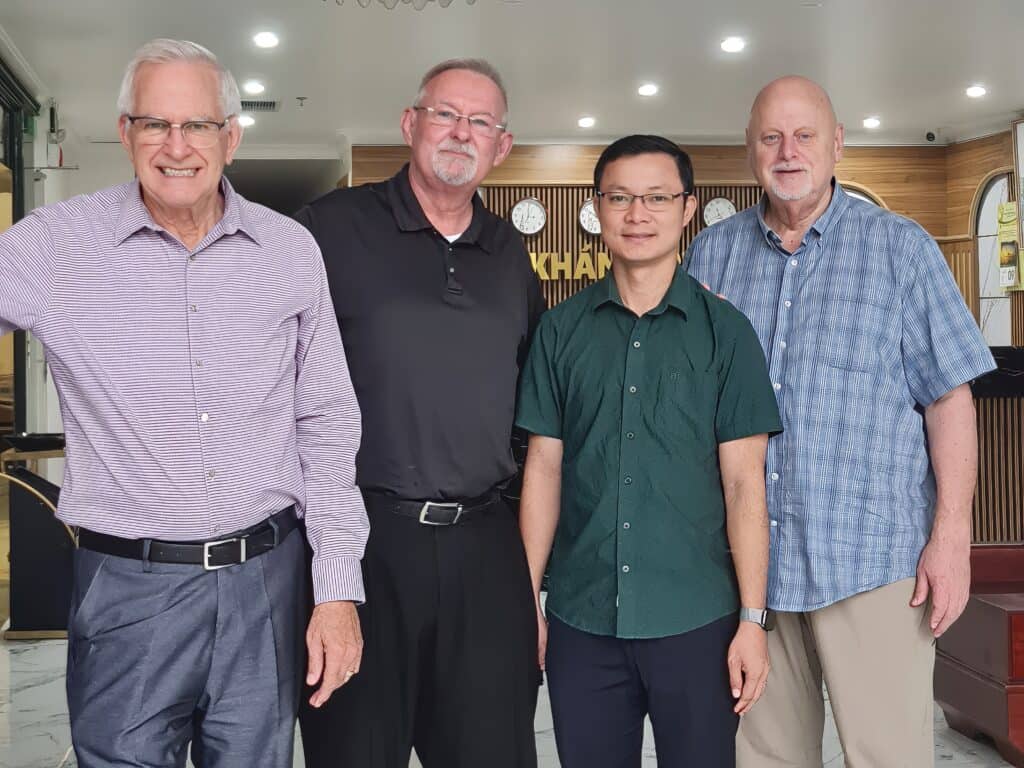
When we first started supporting Vietnamese preachers thirty-two years ago, I would estimate that 95% of the donors were Vietnam War Veterans. So many times, often with tears, men would speak to me at churches and say they had served in Vietnam and now wanted to do something to help the people. One Vet told me he wanted to change the bullets for Bibles. Another poetically summed it up this way, “I brought them death, now I want to bring them Eternal Life.”
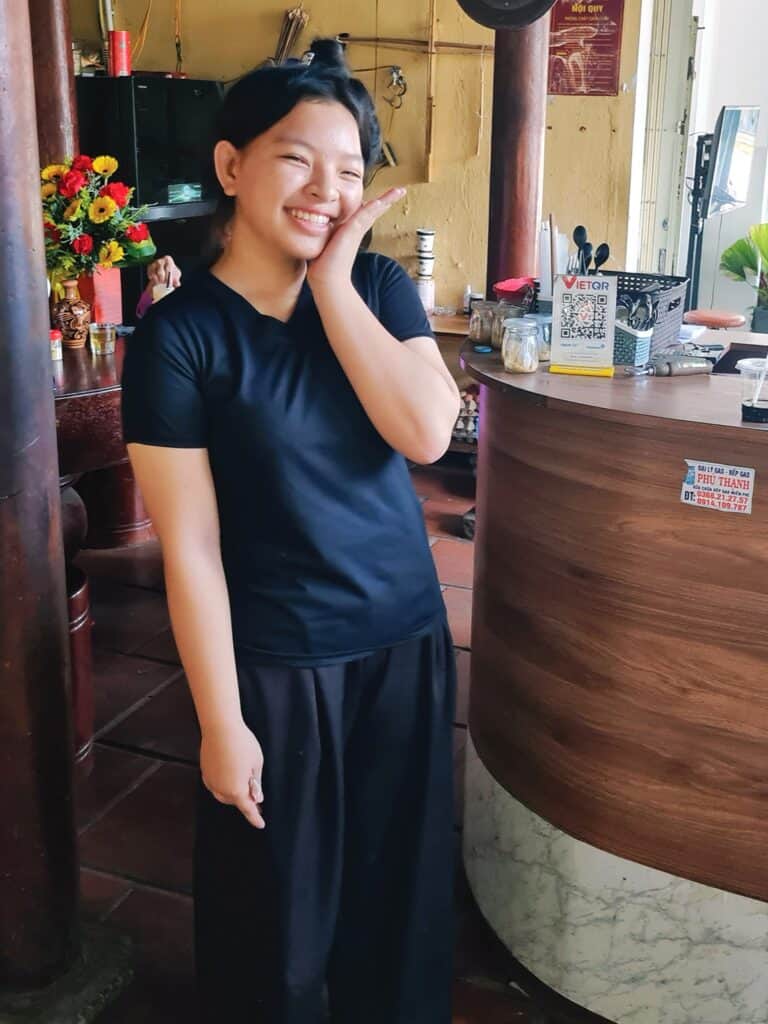
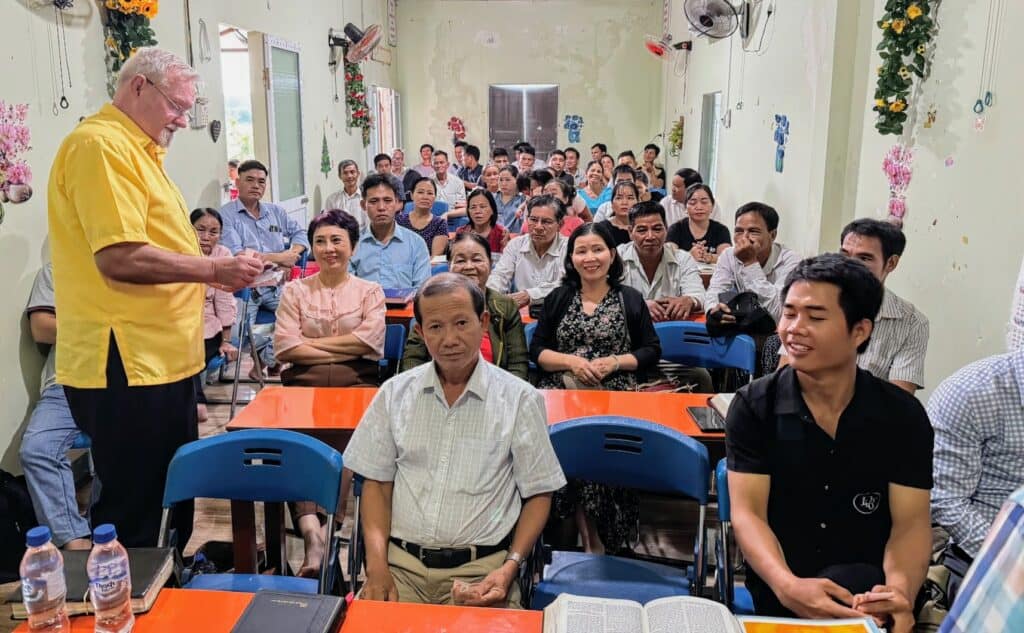
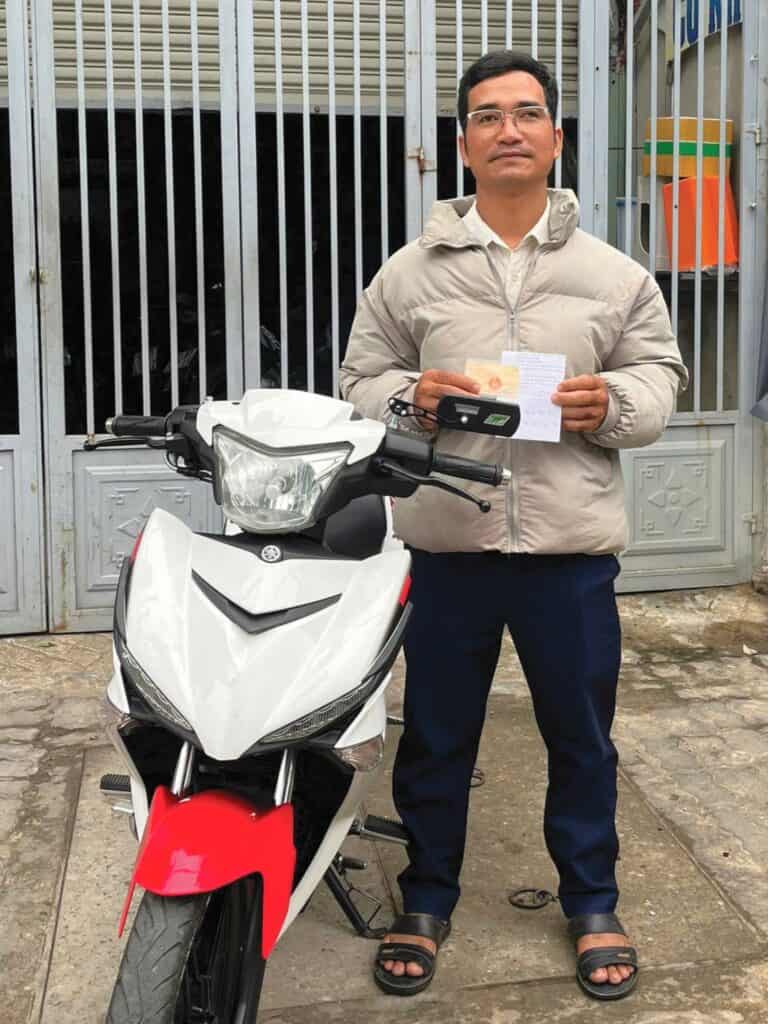
To you, Veterans, let me say that the people of Vietnam do not hate you. They love you and are thankful for what you did and why you did it. However, of today’s population, only 10% lived during the war, and 90% did not. I was amazed at the number of young adults who were totally unaware of the war.
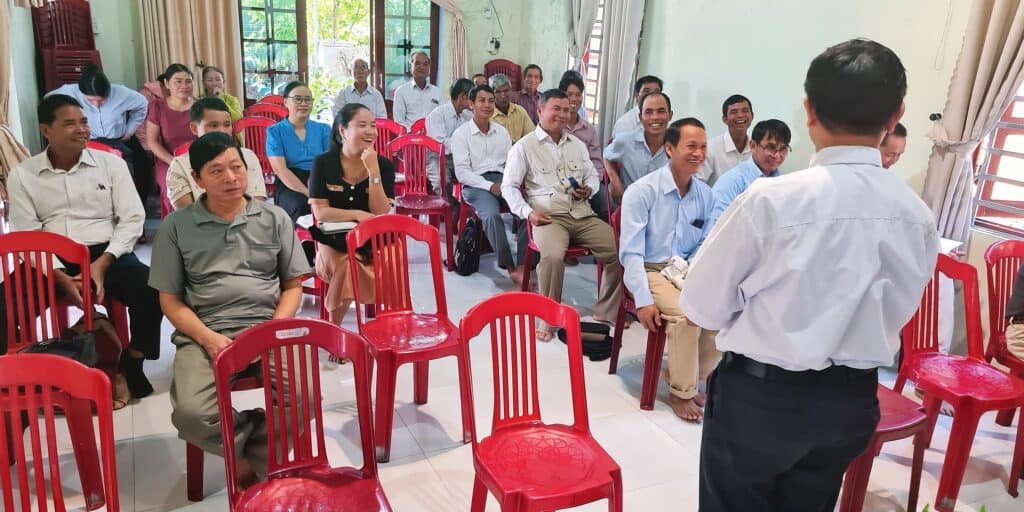
Vietnam has changed. It is a new land with relative freedoms, open to hearing the Gospel, and Believers eager to take it to every corner of the country. Some government members may fight this, but “greater is He who is in us than he who is in the world.” The Great Commission Fund is poised to make a far more significant impact than before – if you’ll help us by donating here.

